In recent developments surrounding the U.S. Securities and Exchange Commission (SEC), President-elect Donald Trump’s rumored frontrunner for the agency’s chair position, Paul Atkins, may be hesitating due to the complexities associated with leading one of the most pivotal financial regulatory bodies in the country. Although Atkins carries significant experience from his previous term as an SEC commissioner, the challenges of the role in its current climate could be proving intimidating.
Reports suggest that Atkins views the SEC chair role as fraught with difficulty, not least because he perceives the agency, under outgoing chair Gary Gensler, as mismanaged. Sources have indicated that this perception plays a critical role in his reluctance to step into what could be a turbulent leadership position. The challenges associated with critically reshaping the SEC to achieve greater efficacy and credibility in its operations can deter even the most seasoned candidates.
The Impending Decision
In light of recent interviews held by Trump’s team with Atkins, speculation abounds about his potential acceptance of the chairmanship. However, his lack of public confirmation combined with these recent hesitations raises additional questions. The role entails significant responsibilities, notably requiring Atkins to relinquish control over his business interests, particularly his consulting firm, Patomak Global Partners. This potential sacrifice adds another layer of complexity to what is already a monumental decision.
Former CFTC Chair Chris Giancarlo emerges as a notable supporter of Atkins, championing him as an appropriate choice to restore the SEC’s credibility and performance. Giancarlo’s backing underscores a belief in Atkins’ capabilities to reform the agency effectively, especially in navigating the intricate regulatory frameworks surrounding digital assets and cryptocurrency markets—a focal point that demands immediate attention and reform within the SEC.
On the other hand, if Atkins stands firm in his hesitations or if his preconditions for acceptance are not satisfactorily met, the Trump administration may be pushed to explore alternative candidates. Speculation includes current SEC Commissioner Mark Uyeda, former CFTC Chair Heath Tarbert, and Robert Stebbins from Willkie Farr & Gallagher LLP. This uncertainty can lead to a fragmented transition in regulatory leadership, potentially delaying critical reforms that the SEC so desperately needs.
Ultimately, Paul Atkins’ potential appointment as SEC chair reflects a larger narrative of uncertainty and transformation within an agency perceived to be struggling with its mission. With growing complexities in financial markets and regulatory frameworks, the stakes are high. Whether Atkins decides to embrace this challenge, or if another candidate is chosen, the crucial need for effective leadership at the SEC remains prevalent in today’s ever-evolving financial landscape. The future of the agency—and by extension, the stability of the markets it regulates—hangs in the balance as stakeholders await a conclusive decision.

